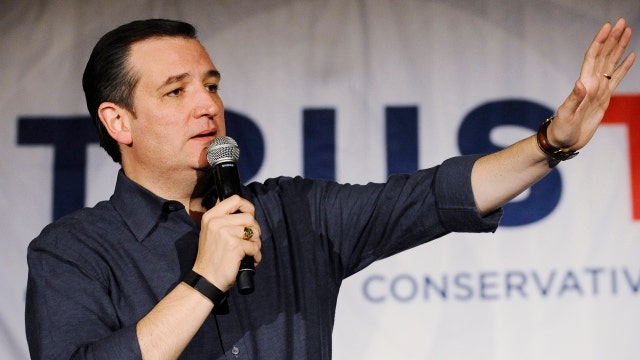Who will finally settle Cruz's presidential eligibility?
Strategy Room: Ellen Ratner and Robert O'Brien debate whether the courts will have to decide whether Ted Cruz's Canadian birth disqualifies him from the race
Is Ted Cruz a natural-born citizen?
While this thorny question has been dismissed as a settled issue by the Cruz campaign and many constitutional scholars, Cruz’s opponents insist it isn't going away. Donald Trump even warns Democrats could use it to derail his candidacy:
The allegations follow the 2008 conspiracy theories about Barack Obama's true birthplace, and questions about John McCain's eligibility. But, with Cruz making no secret of the fact he was born in Canada, his case raises the question: Who can settle this matter once and for all?
Legal scholars aren't entirely sure but suggest the best route might be through the courts.
Here’s what we know. Ted Cruz was born in Calgary, Canada, to an American mother and a Cuban father. Therefore, Ted Cruz is an American citizen.
However, in order to be president of the United States, according to the Constitution, a candidate must be a “natural-born citizen.” The legal debate occupying constitutional scholars is on the precise meaning of this term.
As for who can resolve this, don't look to the Federal Election Commission.
The agency, while devoted to enforcing the rules of federal elections, deals stricly with campaign finance. An FEC spokesman told FoxNews.com that eligibility is not under their authority.
As another option, Trump has suggested Cruz seek a declarative judgment on the case from the courts.
However, Robert Natelson, retired constitutional law professor at the University of Montana and author of the book, “The Original Constitution,” told FoxNews.com many courts would see that as premature.
So what about a congressional resolution? That could be seen as legally flimsy, according to a 2008 piece by Ohio State University Professor Dan Tokaji in the Michigan Law Review.
Both Tokaji and Natelson, though, suggested an outside court challenge to a candidate's eligibility would be a dependable way to resolve such questions.
In his 2008 piece, which pre-dated the Cruz controversy, Tokaji wrote that the best route to challenging a presidential candidate's eligibility may be to head first to state courts. If any drama ensues, the case could then be on the glide path for a U.S. Supreme Court decision.
“In the event that a renegade state court rejects a candidate who is, in fact, eligible or that two or more state courts reach conflicting conclusions on a candidate’s eligibility, U.S. Supreme Court review should be available as a backstop,” Tokaji wrote.
Natelson also said any legal challenge to Cruz’s eligibility could end up in the Supreme Court.
“Ultimately the people decide as they can override through a constitutional amendment," he noted. "But for purposes of 2016, it would be the Supreme Court, and what they have to say would override the FEC or anyone else.”
As to how the Supreme Court would rule in such a case, “it’s a coin toss,” he said.
On the meaning of "natural-born," which originates in British law, some scholars say it indicated a requirement to be born in the country. Another reading also works against Cruz -- that it meant someone born to a British father and foreign mother outside of Britain would be a natural-born citizen. Cruz, though, had a foreign-born father.
“That is most likely how the founders saw that and how they meant to communicate it, and obviously Senator Cruz doesn’t qualify,” Natelson said.
Cruz' case is very different from Obama's or McCain's. Obama was born in Hawaii and only faced questions because some, including Trump, challenged whether that was true. And McCain was born on a U.S. military base to an American father and mother.
Now even McCain says Cruz' eligibility is a question worth looking at.
In Cruz' defense, others point to legal precedent that allows a broader interpretation. The Naturalization Act of 1790, passed by a Congress including many of the founders, determined “the children of citizens of the United States, that may be born beyond sea, or out of the limits of the United States, shall be considered as natural born citizens: Provided, That the right of citizenship shall not descend to persons whose fathers have never been resident in the United States.”
As Cruz’s father was a U.S. resident, it would seem to give him a green light. Professors Neal Katyal and Paul Clement wrote in the Harvard Law Review this is evidence of an even broader interpretation -- that anyone born anywhere to a U.S. citizen parent, as Cruz was, "is a U.S. citizen from birth and is fully eligible to serve as President if the people so choose.”
Others believe the courts will ultimately leave this one up to the people. Professor Derek Muller, associate professor at Pepperdine School of Law, told FoxNews.com that courts would be unwilling to settle a contentious political matter that could be decided by voters.
“Courts are often reluctant to get involved in divisive political questions, Muller said. “I think at this point it might remain an open question for some time -- the most likely way this ends in court is if a state decides to keep him off the ballot and that’s unlikely at this point.”













































